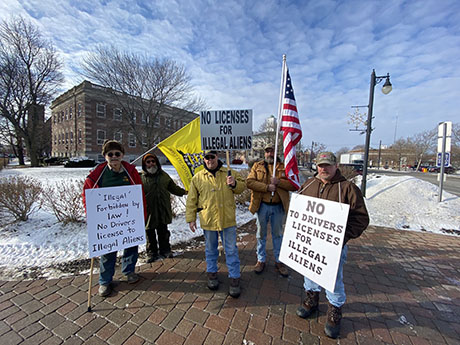U.S. Attorney for the Western District of New York: 'Police Week and Legislative Doublespeak'
By James P. Kennedy Jr., United States Attorney for the Western District of New York
Police Week and Legislative Doublespeak
This week marks National Police Week, a time to honor the call to duty and those who so selflessly answer that call in more than 18,000 law enforcement agencies nationwide. It is also a time to pay tribute to the 89 officers who lost their lives in 2019 in the line of duty.
On any given day, officers, deputies, and agents face the worst-of-the-worst in our society. Drug dealers filling our streets with deadly poisons, violent gang members holding neighborhoods hostage, predators stealing the innocence of our youth, and human traffickers dehumanizing vulnerable females and robbing them of their dignity. Each day, members of law enforcement deal in danger and risk their lives to safeguard and protect our community.
However, this year, the risks faced by law enforcement are even greater, as they have remained vigilant in their effort to protect us from criminals while also battling the new and invisible enemy. Sadly, as of May 7, 2020, 92 law enforcement officers have died from COVID-19 nationwide, including 29 officers right here in New York State. “Greater love hath no man than this, that a man lay down his life for his friends.”
As U.S. Attorney, I feel fortunate to interact on a daily basis with all levels of law enforcement whose members prove to me, day-in and day-out, that most risk their lives each day with one primary motivation — and that motive is their love and concern for their fellow man. This year, however, COVID-19 represents but one silent threat they face. The other silent threat came from legislation that was quietly enacted as part of the New York State 2020 budget.
Shockingly and sadly, the recently enacted legislation, threatens to hold the brave men and women of law enforcement criminally liable simply for choosing to assist certain other members of law enforcement. Indeed, while our law enforcers were busy risking their lives responding to those engaging in criminal conduct — and the attention of others was directed toward the silent killer — the New York State legislature in April silently passed legislation which criminalizes the sharing of certain information between law enforcers.
Specifically, the newly enacted law makes it a felony for any law enforcer to share New York State DMV information with any fellow law enforcer whose duties include the enforcement of immigration laws. While January’s Green Light Law prohibited the sharing of such information, the April amendment takes the prohibition to a whole new level by making it an E Felony for any law enforcer to do so.
That any elected official would see wisdom in criminalizing an effort by one member of law enforcement to share information with another law enforcer — essentially legislating obstruction of law enforcement — is antithetical to the rule of law and our system of justice. The new law impedes the ability of a number of my federal law enforcement partners — including Homeland Securities Investigation (HSI), Immigration and Customs Enforcement (ICE), Customs and Border Protection (CBP), the Border Patrol, and Department of Homeland Security (DHS) to investigate the criminal behavior of all citizens, not just those who are illegally present in the United States.
The new law essentially pits members of law enforcement against one another.
The pandemic has taught us at least a couple of important lessons. One is that borders matter. Another is that successful responses to threats to our safety and well-being require cooperation and coordination rather than unilateral action.
As we pause to give thanks to our law enforcers this week, we recognize the difficulty of the jobs they face. The last thing that they — and the public they protect — deserve is legislation which obstructs their mission, endangers their safety by causing DHS agencies to operate blind when it comes to DMV data, and criminalizes the cooperation which has time and again proven to be so critical to the preservation of public safety.
Indeed, amidst this crisis, such legislation might rightfully cause some to question just how important the safety and well-being of the law enforcement officers and the residents of this state truly are to those who enacted it.


